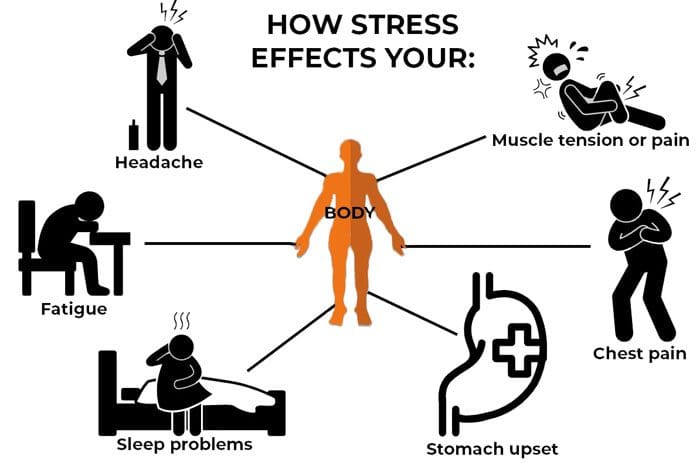More individuals are reporting extreme levels of stress. Studies indicate that an increasing number of individuals are feeling worried, anxious, or depressed regularly from various stressors. Maintaining the body’s health includes:
- Following a balanced diet
- Getting enough exercise
- Taking vitamins or supplements to ensure the body gets what it needs for optimal function.
However, research has found that a sudden increase in stress, specifically stress associated with anger, can trigger:
- Arrhythmias
- Heart attacks
- Sudden death
This type of stress can affect individuals that did not know they had heart disease. Intense short-term stress can have dangerous effects on the body’s health, leading to chronic stress. Chronic stress continues at a low level for weeks, months, or years. It can significantly change the way the body functions. Stress management is very important for overall well-being. Learning how to handle stress properly is the goal.

Table of Contents
Poor Stress Management
When stress hits it triggers the brain to release various hormones. These hormones increase heart rate and raise blood pressure. This comes from evolution that helped early humans escape from predators and stay safe from different types of physical danger. This same stress reaction is what we go through, however, it is not to escape danger but to deal with work, family, school, commuting, and social issues, etc. And when the stress response happens on a regular basis it can have serious and long-term effects on the body’s ability to function properly. Stress includes mental, behavioral, and physical symptoms. The effects of stress that are most familiar are related to mood. Mood changes that can result from chronic low-level stress include:
- Feelings overwhelmed
- Increased anxiety
- Generalized anxiety that is not connected with anything specific
- Unmotivated or unfocused
- Sadness
- Depression
- Irritability
- Impatience
- Unusually quick to anger
- Restlessness
These mood changes can be tied to changes in behavior. The following behaviors are associated with increased stress levels:
- Alcohol and/or drug abuse
- Starting or increasing tobacco use
- Eating changes – undereating or overeating
- Withdrawing from friends and family
- Avoiding social interaction
- Little to no physical activity
Physical effects that are associated with long-term stress.
Chronic stress that lasts for a long period can affect the whole body. The immune system, digestive system, sleep cycles, etc. Physical symptoms include:
- Tension in the neck and back
- Persistent headaches
- Stomach aches
- Constant fatigue, even after waking up
- Sleeping pattern changes
- Insomnia
- Muscle pain
- Changes in libido
- Being more prone to infections because of a weakened immune system
- Chest pain
Learning Healthy Stress Management
Mental health is now an important part of living a healthy life. Stress comes from all kinds of different places. We can’t always change these moments, but we can change our reactions to reduce the negative effects and results. To manage stress, it is important to know what is causing it.
- It could be an argument with a boss, co-worker, family member, or significant other.
- Work deadlines
- School grades, teachers, kids, etc
- Bills
- Repairs
Clearly identifying the main stressors will help individuals anticipate them and form a plan. There are different ways of dealing with it. The different strategies need to be researched and tried by individuals to see what works for them. Think about what helps the mind and body relax and unwind. A few recommended ways include:
- Watching favorite shows or movies
- Listening to music
- Breathing techniques
- Spend time with friends or family
- Make time for yourself to do something you love – alone time
- Unplug from devices like phones, tablets, or computer
- Play a sport
- Practice yoga
- Physical activity
- Take a nature hike
- Write, paint, sculpt, knit, sew, crafts, make music, play instrument/s – real media or digital
- Meditate and practice mindfulness techniques
These are strategies that can be incorporated into regular daily life. Be sure to set time aside to focus on mental wellbeing. Learn to recognize the signs when getting overwhelmed. Don’t hesitate to ask for help when needed. This can be a support system or mental health professional. This is to empower individuals to take better care of themselves in both body and mind.
Body Composition
Setting Attainable Goals
Individuals that have trouble achieving health goals might want to look at the goals themselves. Individuals typically have a general idea of their fitness journey. However, it is hard to reach those goals without a map. Losing weight or getting healthy is the goal but these goals are not measurable. This is too broad that can be different things to different people. Trying to accomplish a vague goal makes it hard to plan, making it happen, or seeing progress. A recommended strategy for goal setting is to use the SMART system. The acronym stands for:
- Specific
- Measurable
- Attainable
- Realistic
- Timed
When goals fall into these parameters, it provides a clear picture of what is trying to get accomplished and the ability to plan accordingly. An example could be: An individual will work out at home or the gym for one hour, five days a week for one month. This is a specific and measurable goal when compared to I’m going to work out more. This provides clear guidelines of what needs to happen to achieve success.
References
Bailey, Ryan R. “Goal Setting and Action Planning for Health Behavior Change.†American journal of lifestyle medicine vol. 13,6 615-618. 13 Sep. 2017, doi:10.1177/1559827617729634
Carlson, Linda E et al. “Integrative Approaches to Stress Management.†Cancer journal (Sudbury, Mass.) vol. 25,5 (2019): 329-336. doi:10.1097/PPO.0000000000000395
Jamison, J R. “Stress management: an exploratory study of chiropractic patients.†Journal of manipulative and physiological therapeutics vol. 23,1 (2000): 32-6. doi:10.1016/s0161-4754(00)90111-8
Jamison, J. “Stress: the chiropractic patients’ self-perceptions.†Journal of manipulative and physiological therapeutics vol. 22,6 (1999): 395-8. doi:10.1016/s0161-4754(99)70085-0
Post Disclaimer
Professional Scope of Practice *
The information herein on "Stress Management and The Body's Health" is not intended to replace a one-on-one relationship with a qualified health care professional or licensed physician and is not medical advice. We encourage you to make healthcare decisions based on your research and partnership with a qualified healthcare professional.
Blog Information & Scope Discussions
Welcome to El Paso's Premier Wellness, Personal Injury Care Clinic & Wellness Blog, where Dr. Alex Jimenez, DC, FNP-C, a Multi-State board-certified Family Practice Nurse Practitioner (FNP-BC) and Chiropractor (DC), presents insights on how our multidisciplinary team is dedicated to holistic healing and personalized care. Our practice aligns with evidence-based treatment protocols inspired by integrative medicine principles, similar to those found on this site and our family practice-based chiromed.com site, focusing on restoring health naturally for patients of all ages.
Our areas of multidisciplinary practice include Wellness & Nutrition, Chronic Pain, Personal Injury, Auto Accident Care, Work Injuries, Back Injury, Low Back Pain, Neck Pain, Migraine Headaches, Sports Injuries, Severe Sciatica, Scoliosis, Complex Herniated Discs, Fibromyalgia, Chronic Pain, Complex Injuries, Stress Management, Functional Medicine Treatments, and in-scope care protocols.
Our information scope is multidisciplinary, focusing on musculoskeletal and physical medicine, wellness, contributing etiological viscerosomatic disturbances within clinical presentations, associated somato-visceral reflex clinical dynamics, subluxation complexes, sensitive health issues, and functional medicine articles, topics, and discussions.
We provide and present clinical collaboration with specialists from various disciplines. Each specialist is governed by their professional scope of practice and their jurisdiction of licensure. We use functional health & wellness protocols to treat and support care for musculoskeletal injuries or disorders.
Our videos, posts, topics, and insights address clinical matters and issues that are directly or indirectly related to our clinical scope of practice.
Our office has made a reasonable effort to provide supportive citations and has identified relevant research studies that support our posts. We provide copies of supporting research studies upon request to regulatory boards and the public.
We understand that we cover matters that require an additional explanation of how they may assist in a particular care plan or treatment protocol; therefore, to discuss the subject matter above further, please feel free to ask Dr. Alex Jimenez, DC, APRN, FNP-BC, or contact us at 915-850-0900.
We are here to help you and your family.
Blessings
Dr. Alex Jimenez DC, MSACP, APRN, FNP-BC*, CCST, IFMCP, CFMP, ATN
email: [email protected]
Multidisciplinary Licensing & Board Certifications:
Licensed as a Doctor of Chiropractic (DC) in Texas & New Mexico*
Texas DC License #: TX5807, Verified: TX5807
New Mexico DC License #: NM-DC2182, Verified: NM-DC2182
Multi-State Advanced Practice Registered Nurse (APRN*) in Texas & Multi-States
Multistate Compact APRN License by Endorsement (42 States)
Texas APRN License #: 1191402, Verified: 1191402 *
Florida APRN License #: 11043890, Verified: APRN11043890 *
License Verification Link: Nursys License Verifier
* Prescriptive Authority Authorized
ANCC FNP-BC: Board Certified Nurse Practitioner*
Compact Status: Multi-State License: Authorized to Practice in 40 States*
Graduate with Honors: ICHS: MSN-FNP (Family Nurse Practitioner Program)
Degree Granted. Master's in Family Practice MSN Diploma (Cum Laude)
Dr. Alex Jimenez, DC, APRN, FNP-BC*, CFMP, IFMCP, ATN, CCST
My Digital Business Card
RN: Registered Nurse
APRNP: Advanced Practice Registered Nurse
FNP: Family Practice Specialization
DC: Doctor of Chiropractic
CFMP: Certified Functional Medicine Provider
MSN-FNP: Master of Science in Family Practice Medicine
MSACP: Master of Science in Advanced Clinical Practice
IFMCP: Institute of Functional Medicine
CCST: Certified Chiropractic Spinal Trauma
ATN: Advanced Translational Neutrogenomics





 Again, We Welcome You.
Again, We Welcome You.
Comments are closed.